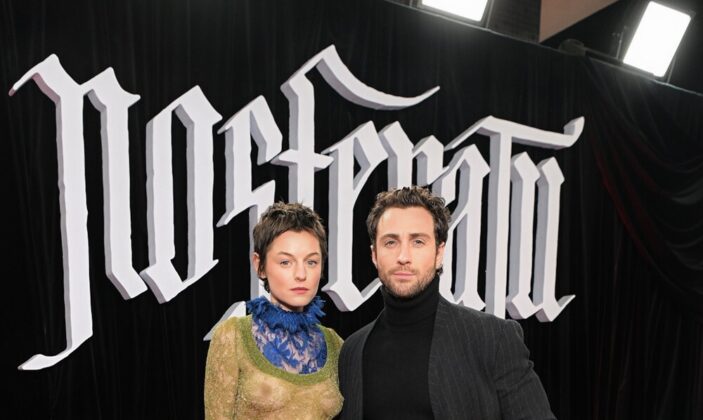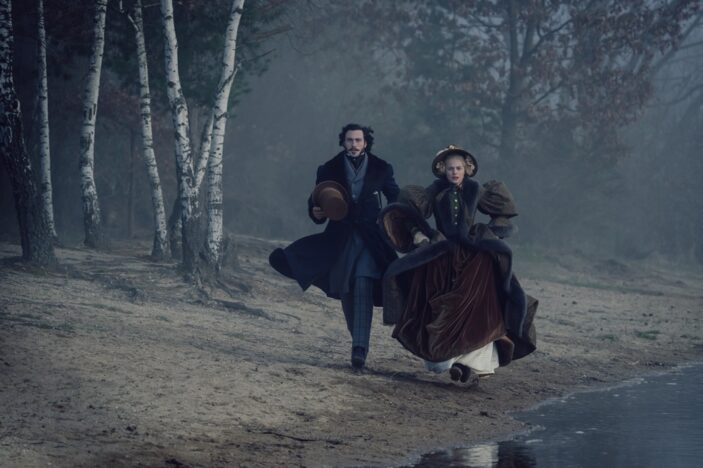
Described by our own Peter Gray as “An experience beyond mere audience transportation” – you can read our full review here – Robert Eggers’ Nosferatu is a gothic tale of obsession between a haunted young woman and the terrifying vampire infatuated with her, causing untold horror in its wake.
As the immersive horror film prepares to terrify audiences this holiday season (nothing says Happy New Year like a vampiric tale), Peter was invited to the global press junket to speak with several creatives involved, including Aaron Taylor-Johnson and Emma Corrin, who star as an aristocratic couple who bear witness to the horrors first hand, touching on their personal views of what the genre can reveal about people, navigating the specificity of their director’s intent, and the discomfort experienced in viewing Lily-Rose Depp’s transformative performance live on set.
The film explores the nature of fear and humanity. Did portraying these themes affect your personal view of horror and what it can reveal about people?
Aaron Taylor-Johnson: Love that, love that, love that. Very interesting. How do you feel about that (Emma)? You have an interesting view about fear…
Emma Corrin: I think people are really fascinated by fear. I think that’s why we’ve always had myths and folklore, and being sort of a bit obsessed with the dark side of things. I think it maybe helps us to confront parts of ourselves. It’s kind of like you don’t want to look, but can’t not look. It’s a morbid fascination.
Aaron Taylor-Johnson: What’s kind of interesting is the shame of it as well, because (Lily-Rose’s character) carries this shame. There’s a perversion to this darkness. It’s a metaphor, isn’t it? Like, having this shame, because she has this child-like trauma that comes to revisit her, and in her adult life she wants to push away because she’s a newlywed. There’s these new prosperous things on the horizon, and so I just find it sort of a metaphor for love and relationships and marriage, and hiding and locking away these little impurities that we are afraid of. She’s then facing that fear head on. It’s really interesting, but that’s just, you know, Robert Eggers, as well, and his storytelling.
And Lily-Rose does some pretty extraordinary things physically in this, and in scenes that you are both in. How much of Emma and Aaron’s reactions are in those of your characters?
Emma Corrin: I mean, in an Eggers film you end up doing quite a lot of takes, but I reckon there’s a few good takes in there where it’s just sort of…it was an extraordinary thing to watch. We really didn’t know what we were about to watch, because when we’d rehearse (Lily-Rose) hadn’t been doing it for real. No wonder people think it’s CGI, because it is extraordinary contortion. Yeah, our jaws were on the floor. I’m pretty sure Robert said, like, “A bit less. For both of you.”
Aaron Taylor-Johnson: She’s so committed. It was so remarkably disturbing. I remember we both stood there and we had this look of shock on our face. But I also remember thinking, “I don’t know if we should be (here). Is this a closed set?” It felt like we were witnessing something that we weren’t privy to seeing. I just felt like I wanted to actually be protective. I wanted to cover her up. It was so brilliant, seeing Lily-Rose have all these dimensions that made you feel so empathetic towards her situation. But there was also no vanity to it. It was so lovely to see Lily-Rose in a way that was so raw, and as an actor you just go, “Fucking hell!” Beg the pardon, but it was so brilliantly shocking. To me, it was the most terrifying thing.

Having both spoken about the emotional state of your characters. Do you feel these roles allowed the both of you to explore parts of yourselves as actors that you felt previous roles hadn’t?
Aaron Taylor-Johnson: I think just working with Robert, and Emma has talked about it, where your devices are taken away and your safety nets, and there’s no room for improvisation. We would do 31 takes and they probably all look the same, I feel like you’re taught that each take should be different. Give some versatility. So, you know, a director can choose in the edit. But here, it’s one set-up shot. This is where you hit the mark. This is where the lights are facing. And these are the lines. And (Robert) wants you to be on top of each other’s lines, because it was timed out. It was all very thought through. You felt a bit like a puppet in a way. There were times where my eyebrows are moving too much, and I don’t even realise. And (Robert) says “You need to stop doing everything.” It’s a lesson in being able to just constantly strip away.
I think that added to the element of the suspense of the movie, because all our performances are very stylised. It’s like in that period of time, it’s just very matter of fact, and the emotional intelligence is sort of pushed down that it starts to bottle. You feel like it’s going to pop at any moment. And that builds throughout the movie. Everyone eventually loses their shit, goes out of their minds, or is sleep deprived, or screaming their heads off. And that’s so beautifully told throughout the stillness, and I think (Robert) is just a master at that. And I think learning and knowing that, I think we definitely grew in those kind of ways.
The period piece element of the film has a lot to do with how you feel like your character’s voice should be. There’s an accent that we know from film that comes with that. What elements that you saw in the script helped you find cadence and voice to your characters?
Emma Corrin: Rob writes dialogue in a very specific way. He also tends to ask you to perform it in a very specific way. He sort of asks you to basically just say the words, not too much embellishment or emphasis on random things. He’s very much the same with the way he approaches facial expressions (as Aaron said), which is less is more. Stillness is more. And I think that actually helps. He writes the language very specifically. He has a great attention to the detail. So, I think if you just deliver it as it’s written, then he knows that he will get what he wants, period wise. Yeah, he created these bibles for us, for each character, and there’s so much detail in there that hinted towards what they might be going through in that period. Their expectations, their opinions, their views. That kind of thing. And that helped.
Nosferatu is screening in Australian theatres from New Year’s Day, January 1st, 2025, following its release in the United States on Christmas Day, December 25th, 2024.
